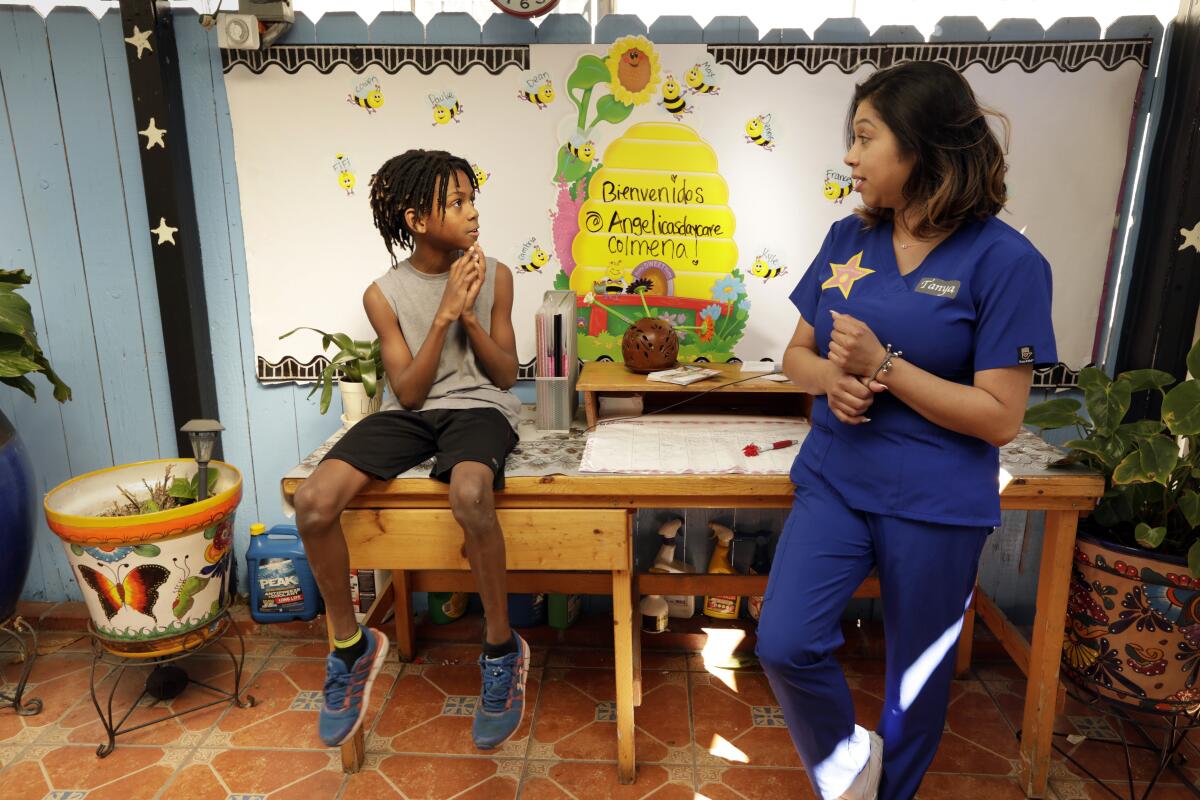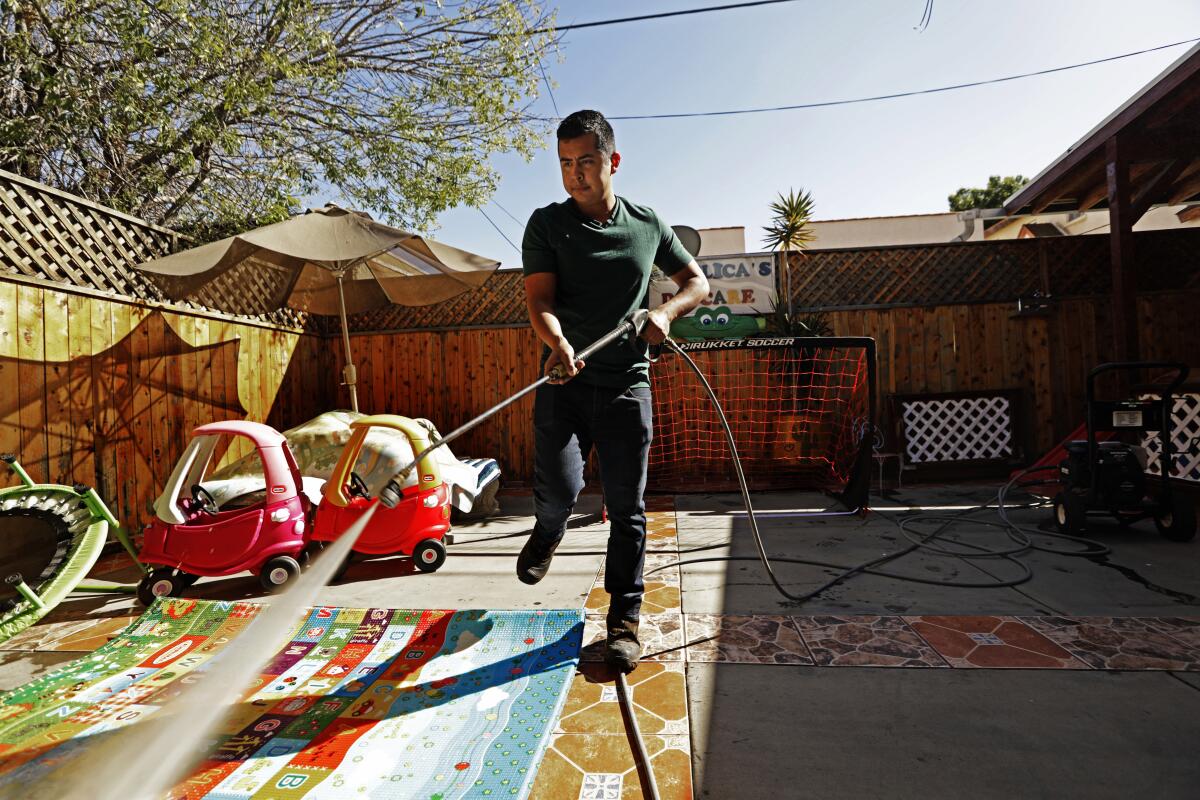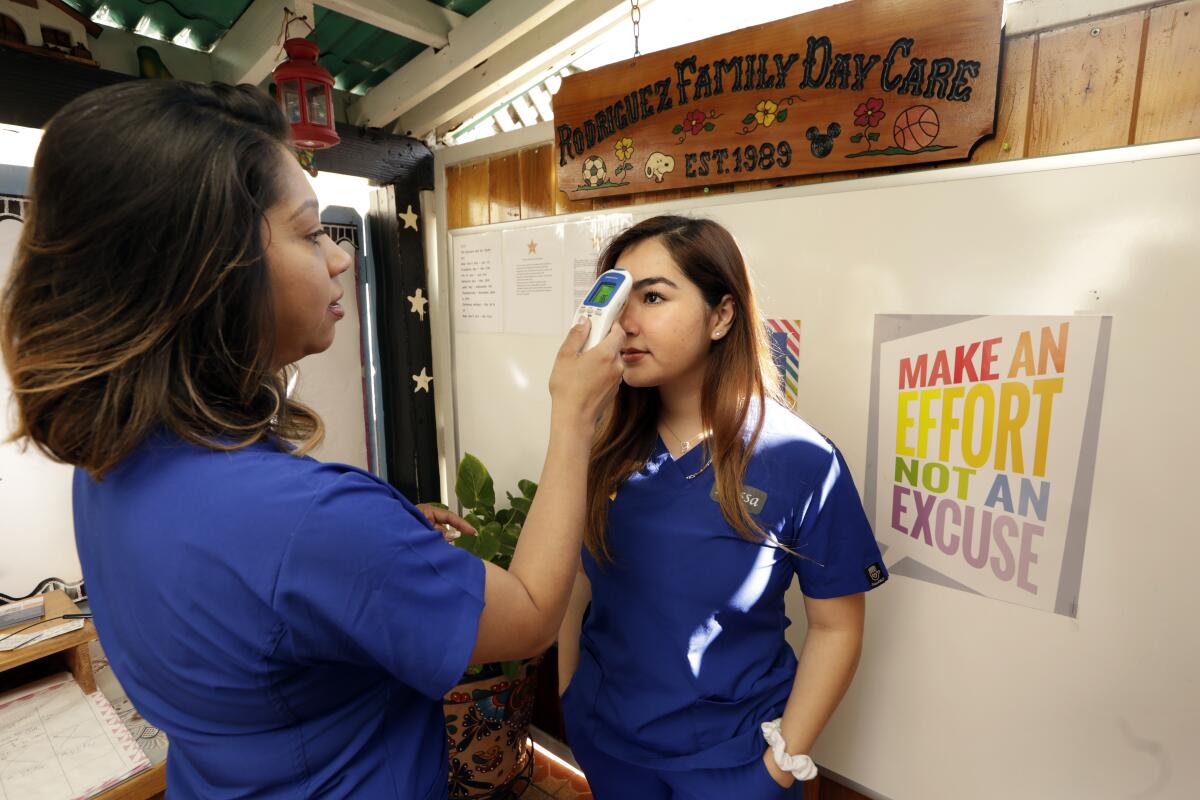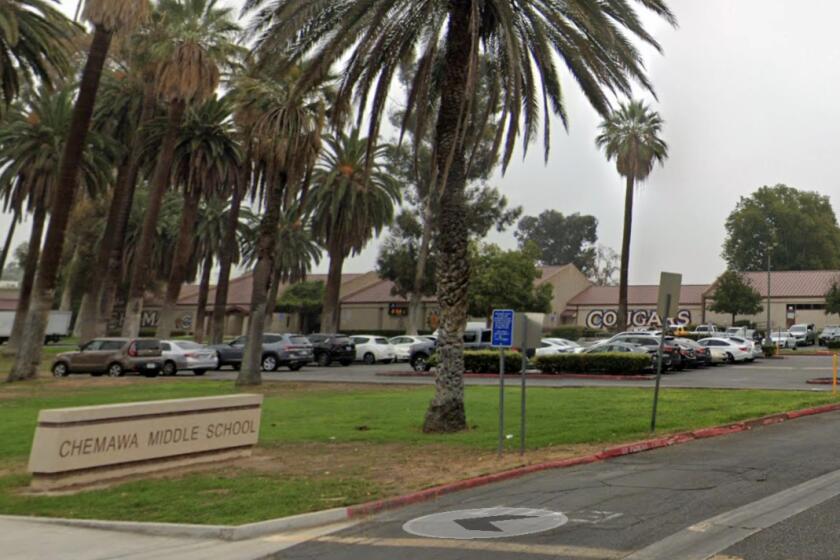Child-care providers need supplies, coronavirus guidance as day-care system suffers

California’s early childhood care system has long been held together by women such as Tanya García, whose Hollywood duplex is home to two licensed day-care operations serving as many as 28 youngsters — among them the children of healthcare workers and public school teachers.
As hundreds of large preschools and day-care centers have closed amid statewide school shutdowns and stay-at-home orders, many children of essential workers are now being watched over by lone providers — mostly women working in their homes with help from family members. In L.A. County, experts say 75% are immigrants.
However, these providers are facing intense pressure to not only care for little ones during stressful times, but do so with scarce state guidance, dwindling necessary supplies, and growing fears of contracting COVID-19, leaders and advocates in the industry say.
Some have seen attendance shrink as parents are laid off — and if the day-care businesses are forced to close, many child-care advocates fear their services will not return. Other providers are overwhelmed with new requests for care, but have little guidance about when and how to take on new families.
“They keep telling us, do what you think is best,” García said of the state social services department, which licenses preschools and home-based facilities such as hers. “All of us are still healthy, we’re going to keep open and see where it goes.”
Day-care centers and home-based providers have been declared essential businesses by the state and are exempt from closure.
Yet, nearly a quarter of larger school-based and stand-alone early child-care facilities statewide shut down, and experts predict more will follow.
In Los Angeles, the closures have been more acute, at 36%. But as of Monday, only about 450 of the state’s more than 28,000 licensed family child-care homes have closed — and nearly 6,000 remain open in Los Angeles.
“Our child-care facilities play an important role in absorbing the impacts of school closures,” said Jason Montiel, a spokesman for the state Department of Social Services. “Californians who are performing essential work, including healthcare workers and those in public safety, rely on child care so they can do their jobs.”
The need for day care during the coronavirus emergency is hard to overstate.
Almost 80% of American healthcare workers are female: A significant majority of nurses, respiratory therapists, physician assistants and doctors under 35 are women. Close to 30% of healthcare workers in California have children under 14. Most are the primary caregiver in their families. If even a fraction were forced to stay home, it could exacerbate the extreme staffing shortages many hospitals now predict.
“We’ve committed to staying open until someone tells us we have to close,” said Lisa Wilkin, executive director of the Child Development Consortium of Los Angeles, which runs early education facilities at Olive View-UCLA Medical Center and LAC-USC Medical Center.
“Because we are on county hospital ground, we have committed to be open during emergencies,” she said.
But the resources available to Olive View-UCLA and similar larger facilities that remain open are very different from those of more isolated home-based providers.
On March 16, the same day most K-12 districts closed, the state social services department issued new guidance to preschools and day-care providers, including stepped-up cleaning and sanitation procedures.

“We’ve been having conference calls with [state] licensing and with the health department,” said Martha Ortega, site supervisor at West Hollywood Preschool at Plummer Park, which serves low-income families. “As long as we have the materials, they’re telling us we should be open.”
Among those materials are disposable gloves, which licensed child-care providers were already required to wear every time they changed a diaper. Yet, home day-care operators must buy their gloves and wipes from the same big-box stores where panicked hoarders have emptied the shelves.
“Providers are telling us they need diapers, they need wipes, they need cleaning supplies,” said Jason Harris of Pathways LA, an early learning nonprofit. “They’re calling us and saying, ‘What do we do?’”
The lack of coordinated emergency help for home-based day-care providers is rooted in California’s disjointed state preschool and early childhood education system. Unlike a school district that provides support to its campuses, there is usually no intermediary between a home day-care provider and the massive state social services department.
“The biggest question for family child-care homes is, what am I supposed to do?” said Kim Kruckel, executive director of the Child Care Law Center in Berkeley. “Am I allowed to stay open? Am I supposed to close? There has been no direct governance from the state, and the local [authorities] are saying child care must stay open.”
The California Department of Social Services licenses all early childhood care providers, but local authorities, not the state, have made closure decisions on behalf of the larger facilities under their jurisdiction, including Head Start programs, parochial preschools and corporate day-care facilities.
For Delaney Wright Fine Arts Preschool, a private early childhood center in Hollywood, the decision to close last week came from the Episcopal Diocese. For Fountain Avenue Head Start, it was a directive from the Los Angeles County Office of Education, the largest of about 30 local agencies that administer the federally funded early learning program.
“How do you tell a 3-year-old to keep his hand out of his mouth?” said Keesha Woods, executive director of the Los Angeles County Office of Education’s Head Start and Early Learning Division. “Part of the reason we made the decision to close classrooms is that you can’t control for that.”
But for Angelica’s Daycare, less than a mile from both preschools, the choice rests with García, 32, and her mother Angelica Rodríguez, 53, who started the business 30 years ago.

While the March 16 directive from the Department of Social Services made some rules more stringent, it also waived or relaxed many others, particularly for home-based providers.
Staffing ratios were eased across the board, including for hundreds of thousands of “Trustline providers” — nannies and baby-sitters who’ve undergone state background checks — who may now watch up to 10 children from different families together, just as licensed providers do.
Experts said home settings were safer in an outbreak than larger multi-classroom early learning centers, because most are either largely or totally staffed, run and cleaned by a single family, limiting contact to a small social network. Even the largest home center can take no more than 14 children.
On March 18, the California Department of Education announced it would continue to pay for state-subsidized care through June 30. Such protections are likely to boost home-based providers such as Angelica’s Daycare, where more than half of the children receive government vouchers and many are now home with laid-off parents.
In theory, those facilities could absorb the children of critical workers, as the hospital-based Child Development Consortium facilities have done. But such efforts have so far been local and limited.
Instead, many early childhood education advocates fear the crisis will accelerate the permanent closure of home day care that has been happening for years.
Although the state added more than 3,000 spots in stand-alone early childhood education centers between 2017 and 2019, many home day-care operations closed in that same period, because most operate without any financial cushion and many older caregivers are retiring. The net result was 10,000 fewer spots. In L.A. County, 14,000 spots disappeared.
“Their margins are razor thin,” Kruckel said. “There are a lot of people who love children and are really good at taking care of kids, but it’s so low-paying because legislators have chosen to pass it off as a personal issue.”
California’s new Early Childhood Policy Council was intended to help change that and was charged with drafting a road map for the state to provide more comprehensive early childhood care while streamlining existing bureaucracy.
The early childhood education systems “are quite complex, so we are ... [working] to make it easier for families to navigate,” said Kim Pattillo Brownson, vice president of policy and strategy at First 5 LA, a leading child advocacy organization.
But those changes may not come soon enough for thousands of home-based providers such as García.
“I made my pay for two weeks,” but if more parents lose their jobs and keep children home, the next two may be difficult, García said. “We also have our staff, and they’re asking, what’s going to happen to us?”
Cristina Alvarado, executive director of Child Care Alliance of Los Angeles, said the pandemic’s full impact on home day cares may not be felt for months.
“I think a lot are going to close for reasons out of their control,” she said. “Once this is over, we need to figure out how we’re going to re-create the child-care system.”
More to Read
Sign up for Essential California
The most important California stories and recommendations in your inbox every morning.
You may occasionally receive promotional content from the Los Angeles Times.











